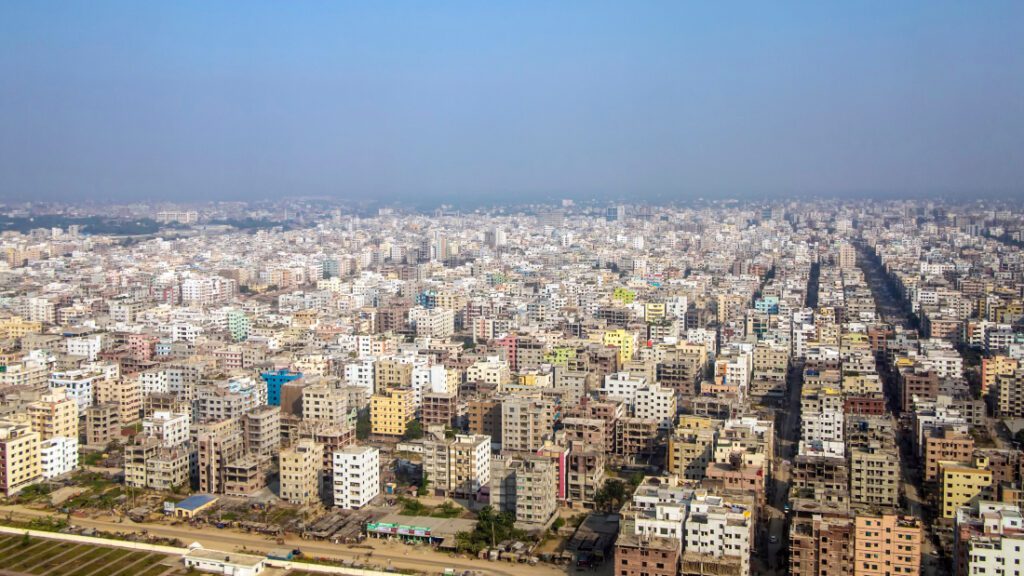Dhaka releases its first-ever Climate Action Plan (CAP) to improve lives, reduce pollution and increase resilience to increasing climate impacts.
Today, Dhaka North and South City Corporation (DNCC and DSCC) unveiled Dhaka’s first-ever Paris-aligned climate action plans. The plans will serve as a roadmap for Dhaka North and Dhaka South to become carbon-neutral by 2050, aligning with Bangladesh’s National Commitment of conditional emissions reduction target of 89.47 MtCO2e by 2030.
The United Nations Intergovernmental Panel on Climate Change (IPCC) warns of severe damages from potential climate hazards such as natural disasters, heat stress, river and rain-induced urban flooding and cyclones for cities like Dhaka. Dhaka North and Dhaka South’s climate action plans reflect a commitment by political leaders in both cities to address the growing climate crisis through science-based, locally-led actions.
The city has set targets based on thorough analysis and pathway modelling using C40 tools, which will help achieve these goals. The development of the climate action plan is an important step towards beginning its resilience-building journey while assessing the existing and potential climate risks to the city, its populations and its systems. The climate action plans aim to promote strategies to move towards a net zero development pathway, reducing emissions on one hand and adapting and building resilience to climate impacts on the other. The identified climate actions can also help deliver several wider co-benefits such as better air quality, public health, increased access to and availability of sustainable energy, water and mobility, improved sanitation and waste management, and enhanced economic opportunities, among others. All indicated strategies in this Climate Action Plan have been defined to align with the existing National Adaptation Plan (2023-2050) to achieve SDG goals.
To effectively implement this ambitious climate action plan and achieve the outlined goals and targets across various sectors, it is crucial to prioritise key strategies. These strategies encompass rapid transitions to renewable energy sources in different sectors, widespread adoption of electric and non-motorized vehicles, increasing urban green cover, and the endorsement of climate-compatible sustainable practices. This comprehensive approach, which includes raising awareness among stakeholders at different levels, is essential for successfully reducing GHG emissions and enhancing adaptability to current climate impacts. The success of these efforts relies on a coordinated and comprehensive approach across multiple sectors as indicated in this CAP.
Mohammad Atiqul Islam, Mayor of Dhaka North, said: “Dhaka North City has been increasingly experiencing the brunt of climate change in recent years. Heavy and sudden rainfall leading to flooding, water logging and drainage congestion, extreme heat events and increased risk of the spread of vector borne diseases such as dengue have demonstrated the importance of implementing localised mitigation and resilience techniques. Dhaka North has always led the path of climate action in the region. Dhaka’s climate action plan which includes robust targets to improve city-wide heat resilience, healthcare, water supply and waste water treatment is a reflection of the city’s ambition and dedication towards a low-carbon future and improving the quality of life of its citizens.”
Sheikh Faizle Noor Taposh, Mayor of Dhaka South, said: “In spite of having lower per-capita emissions, Dhaka South City Corporation is experiencing the adverse effects of climate change driven by global warming. Dhaka South City Corporation (DSCC) is relentlessly working to reduce city-wide emissions and aims that by 2050, the city will be more livable, climate resilient and environment friendly. DSCC is making a commendable effort to reduce its carbon footprint and promote sustainability. DSCC addresses climate change as a major humanitarian crisis and we have taken strategic measures on priority to protect the environment.”
Mark Watts, Executive Director, C40 Cities, said: “I congratulate Dhaka North and Dhaka South on their commitment to respond to the climate crisis by addressing their biggest sources of emissions and their climate risks, through the launch of the climate action plans, in line with the science and keeping temperatures below 1.5°C.”
Shruti Narayan, Managing Director, Regions, C40 Cities, said: “Dhaka North and Dhaka South are leading the way in showcasing how political commitment and leadership can result in ambitious and implementable climate action plans — which is particularly of importance to the global south, home to cities with the highest climate risk in the world.”
Emani Kumar, Deputy Secretary General, ICLEI and Executive Director, ICLEI South Asia, said: “Bangladesh is actively engaging in significant policy, governance, and systemic transformations to enhance the resilience of its communities and pursue a sustainable, net-zero emissions pathway. The Dhaka North and South City Corporations’ CAPs not only align with national and international climate commitments but also set a proactive example in the global fight against climate change. This plan outlines concrete measures for sustainable urban development, enhancing energy efficiency, and promoting low-carbon transport, aiming for a climate-resilient future by 2050.”

